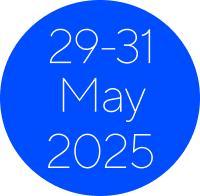Chair: Rachael Lowe (United Kingdom)
Speakers: Larisa Hoffman (United States), Martina Lukin (Georgia), Yara Peterko (Austria)
- Understand the global challenges and priorities in rehabilitation workforce development, including the need for increased supply, enhanced quality of care, and improved regulation.
- Gain practical insights into the IRETT for supporting sustainable rehabilitation workforce development, integrating local perspectives, and creating context-specific solutions to enhance rehabilitation capacity and quality of care.
- Consider actionable strategies for effectively integrating diverse stakeholder perspectives into rehabilitation workforce development initiatives, fostering inclusivity, collaboration, and culturally sensitive approaches to address the evolving needs of diverse populations.
Rehabilitation workforce development is a critical global priority for meeting the diverse needs of populations requiring rehabilitation services. In response to the need to strengthen rehabilitation leadership, planning, and integration across health care, the World Health Organization (WHO) launched the 2030 initiative. Many countries already recognize the need to strengthen the rehabilitation workforce and even have an action plan for implementation activities, but stakeholders may not have the appropriate knowledge, guidance, or means to implement activities to make meaningful change. The International Rehabilitation Education and Training Toolkit (IRETT) provides tools to guide stakeholders through key implementation activities focused on entry-level education, continuing professional development, and professional regulation.
Drawing on insights from the World Health Organization (WHO), the World Rehabilitation Alliance, professional associations, education institutions, and non-governmental organisations, this session demonstrates the use of the IRETT to support active initiatives aimed at strengthening the rehabilitation workforce on a global scale. We will present a model that allows rehabilitation stakeholders to use reflective guidance in key areas for workforce development; academic programs, continuing professional development/ clinical skills, professionalism/regulation, and rehabilitation advocacy. These themes were identified through a global needs assessment including surveys, interviews, and workshops across 88 countries and five rehabilitation professions. Recognising it may not be feasible to approach all priorities for workforce development simultaneously and stakeholders will vary based on the areas of need, each key area for workforce development has its own tool. However, for the strategies to be easily communicated among the different stakeholders, integrated into the healthcare system, and sustainable, they must align with each other and the overall vision for workforce development. Each tool emphasises reflection and incorporates the quality improvement framework: plan, do, assess, and adjust; thereby empowering local leaders to implement change. The IRETT tools allow for this alignment and communication through similar structures and activities that are meant for coordination.
Key objectives of the presentation include understanding the multifaceted nature of rehabilitation workforce development, the importance of quality care improvement, and the development of professional standards, teaching capacity, mentorship for clinical skills, and leaders in rehabilitation. Additionally, the session will delve into the critical role of local stakeholder engagement in shaping effective solutions tailored to specific cultural and contextual needs.
Through case studies and examples, participants will gain insights into how the IRETT can be effectively utilised to address the complex challenges faced by diverse communities worldwide.
Ultimately, participants will leave with a deeper understanding of the global landscape of rehabilitation workforce development, as well as practical strategies for integrating diverse stakeholder perspectives into their initiatives. By fostering inclusivity, collaboration, and culturally sensitive approaches, participants will be better equipped to address the evolving needs of diverse populations and drive positive change in the field of rehabilitation.
Please note: all speakers in this session are affiliated to Physiopedia and the ReLAB-HS project
- Heinemann AW, Feuerstein M, Frontera WR, Gard S, et al. Rehabilitation is a global health priority. BMC Health Serv Res. 2020:20;143.
- Jesus TS, Landry MD, Hoenig H. Global Need for Physical Rehabilitation: Systematic
- Analysis from the Global Burden of Disease Study 2017. Int J Environ Res Public Health. 2019;16:980.
- Khan F, Matya B, de Groote W, Owolabi M, et al. Capacity-building in clinical skills of rehabilitation workforce in low- and middle-income countries. J Rehabil Med. 2018;50(5):472-479.
- Kamenov K, Mills JA, Chatterji S, Cieza A. Needs and unmet needs for rehabilitation services: a scoping review. Disabil Rehabil. 2019;41(10):1227-1237.
- Naicker AS, Htwe O, Tannor AY, De Groote W, Yuliawiratman BS, Naicker MS. Facilitators and Barriers to the Rehabilitation Workforce Capacity Building in Low- to Middle-Income Countries. Phys Med Rehabil Clin N Am. 2019; 30(4): 867–877.
- Rehabilitation in health systems. Geneva: World Health Organization; 2016 (https://apps.who.int/ iris/handle/10665/254506, accessed 8 January 2023).
- The need to scale up rehabilitation. Geneva: World Health Organization; 2017 (https:// apps.who.int/iris/handle/10665/331210, accessed 8 January 2023).
- The rehabilitation workforce in Poland: evaluation report, 2022–2023. Copenhagen: WHO Regional Office for Europe; 2023. Licence: CC BY-NC-SA 3.0 IGO.
- World Health Organization. Rehabilitation 2030: A Call for Action. [cited 2022 Jan 22]. Available from: http://www.who.int/disabilities/care/rehab-2030/en/
See the 24 focused symposia to be presented at congress.
Find out who the key speakers at congress will be.
Find out which clinical topics will be covered in these discussion-based seminars.




